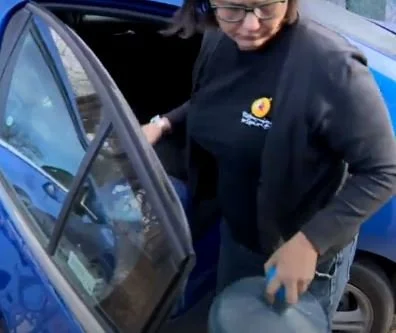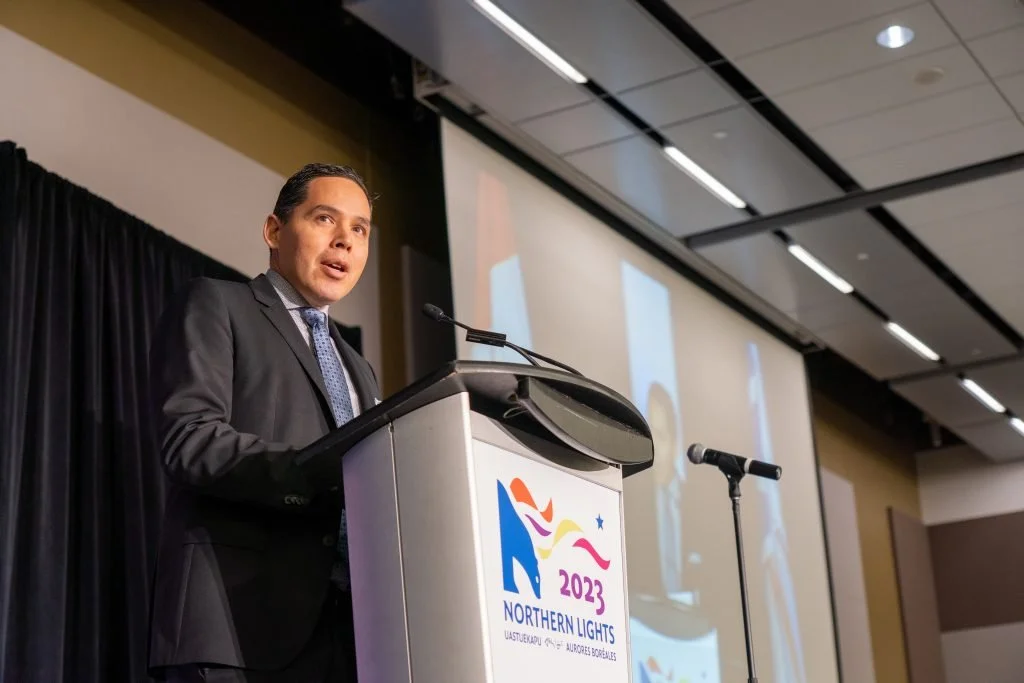Two decades of boil water advisories are over for Hiawatha First Nation after the completion of the first phase of the community’s new water treatment plant and distribution system. A grand opening was held earlier this week for the new plant and system situation in the First Nation located 30 kilometres south of Peterborough. Chief Laurie Carr says the system is a symbol of change for the community which has long advocated for better long-term solutions for boil-water advisories across Canada.
28 Indigenous communities in Canada remain on boil water advisories
Clean water for all has been discussed for many years as a basic human right. Unfortunately many indigenous communities in Canada are put on a boil water advisory every year due to unclean water conditions. According to the government of Canada website, there are currently 28 Indigenous communities that are on long-term boil advisories throughout the country.
New doc to premiere at TIFF shines spotlight on clean water inequities faced by First Nations
The struggle faced by First Nation communities to access clean, potable water is highlighted in a film that will have its world premiere Sept. 15 at the Toronto International Film Festival. Boil Alert is a documentary focused on activist Layla Staats from Six Nations of the Grand River in Ontario. Staats visits Indigenous communities in both Canada and the United States that have boil water advisories.
Drinking water, aquatic life at risk due to B.C.’s fire-ravaged summer: experts
Experts say the extent to which wildfires have burned across the province this year will have serious implications for the quality of B.C.’s watersheds and the ecosystems that rely on them. John Richardson, a Department of Forest and Conservation Sciences professor at the University of British Columbia, says with so many hillsides scorched by wildfires this year, there’s nothing to prevent incoming rain from creating a “debris torrent” — something which spells bad news for the province’s drinking water.
Popular Wakefield spring water still undrinkable, municipality says
Some people are frustrated that a now months-long non-consumption advisory has yet to be lifted at the natural water spring in Wakefield, Que. Kristine Schwartz, a resident in Low, Que., has relied heavily on the water source since her township — about 20 kilometres from Wakefield — has faced boil water advisories on and off for the last two years.
Minister on hand for an end to boil water advisories
There are still 28 boil water advisories left on First Nations in Canada. That's according to Indigenous Services Minister Patty Hajdu. She says the challenge now is making sure there are qualified people to operate the water treatment systems. "A lot of it comes down to water operators," Hajdu said on Wednesday after her visit to Northwest Angle #33.
Newfoundland and Labrador releases new drinking water safety plan
The Newfoundland and Labrador government has released a new plan aimed at improving drinking water safety in the province. The provincial government said from 2017-2022, there have been an average of 191 boil water advisories, which affected 146 communities and about 44,000 people. In comparison, there were 350 boil water advisories throughout the province in 2001.
‘We have to fix it faster’: 28 First Nations communities still under boil water advisories
Wednesday marks World Water Day, a day raising awareness of the more than 2 billion people around the world living without access to safe water, including many First Nations communities in Canada. The federal government says 138 long-term drinking water advisories have been lifted since November 2015, although some short-term boil water advisories have also slipped into the long-term category during that timeframe.
‘This is part of our job’: Obed wants to have the hard conversations
He admitted it can be difficult, pointing to the ongoing challenge of pressuring the federal government to provide drinkable water to Canada’s remote Indigenous communities. Obed said there were 298 boil water advisories between 2015 and 2020, including four that went on for more than a year and 50 that lasted more than three months. “This is part of our job,” he said of keeping Canadian government leaders accountable to fix these problems. “Our job is to articulate and quantify what it means to eliminate an infrastructure gap. These require billions of dollars, new relationships, and on ongoing effort where you tweak it over time.”
Wunnumin First Nation Calls on Canada to Ensure Community Members Receive Individual Compensation Under Class Action Settlement
Chief and Council of Wunnumin Lake First Nation are calling on the Government of Canada to ensure that compensation is provided for community members who have suffered from boil water advisories but are being denied compensation under the terms of a settlement agreement for class-action litigation on Canada’s failure to provide safe drinking water in First Nations communities.
Water operators are ‘heroes’ behind the scenes
Across Canada, 29 Indigenous communities remain under a boil water advisory. Before residents in those communities can brush their teeth, drink a glass of water, cook food, or have a shower, they have to put water in a pot, bring it to a rolling boil, and let it cool — just so they don’t get sick performing many of these everyday activities. Under a commitment by the federal government to permanently eliminate all boil water advisories, 132 have been lifted in the last seven years. But until every Canadian has access to clean, potable drinking water, there is still much work to do, said Steph Romaniuk, faculty in the School of Environmental Studies at Canadore College in North Bay.
Canada’s First Nations Start Filing Claims for Historic Water Settlement
This story was originally published by Grist. You can subscribe to its weekly newsletter here. For years, First Nations in Canada have been denied access to clean drinking water. Many Indigenous communities have to deal with brown, sludgy water and the destructive health impacts it brought. Some have spent years relying on boiled or bottled water. As of March 8, 2022, there were 23 short-term drinking water advisories in place across the country, that range from boil water advisories to Do Not Consume notices. Now, the Canadian government will have to pay for it.
Brown tap water another hurdle for Lynn Lake residents under boil water advisories for decade
Residents of a northern Manitoba town that have had to boil their water for a decade are now dealing with a whole new set of problems — brown water coming out of their taps. On Monday, people who live in Lynn Lake turned on their taps to see brown water flowing out. The next day, local schools and at least one restaurant closed temporarily because of the water.
Campbell River students raising money for water charity
At the beginning of this semester, Gordon’s students have turned their attention to water issues within Canada. Half of the class’s fundraising efforts will go towards Canadian charity Water First, which works exclusively with Indigenous communities in the country. The other half will go towards field trips for the students. “Their goal is to help address water issues and prevent water advisories such as boil water advisories,” Gordon said. “They fund and operate an internship program to work with young Indigenous people to train them to become certified water treatment plant operators, and also help fund water restoration projects in Indigenous communities.” She added the NGO also works with schools in Indigenous communities to offer programs that help school-age children learn about water conservation and restoration.
Saving Sutton's water supply a key election issue for the Quebec town
Access to water is on voters' mind in Sutton, Que., this municipal election. The town, which is about 110 kilometres southeast of Montreal, has had many issues with its water supply over the years. Residents are hoping their next mayor will find solutions to the problem. "There is really not enough water right now," said resident Johanna Ryffel. "You walk by every stream, and the stream beds are almost dry."
COVID-19 outbreak in rural Alberta First Nation exacerbated by social inequities, doctors say
A COVID-19 outbreak in a First Nation in rural Alberta is exposing social inequities that make the spread of the virus quick, and recovery slow, according to doctors and community leaders. Sewepagaham said there are many reasons the virus is spreading quickly, including a lack of health-care staff, boil water advisories and overcrowding of homes. Sewepagaham said the community is constantly on and off boil water advisories, making it difficult for people to stay healthy.
Canada announces $22M in water infrastructure projects
This week, Canadian officials announced the construction of a new water treatment system in Petit-Rocher in New Brunswick, and almost $20M in funding for water infrastructure across the Yukon province. The Petit-Rocher project will see the construction of a new water treatment system that uses nano filtration, along with the expansion of the existing pump station. Additionally, a new treatment system for the filtration backwash, and connections to municipal water services, will also be built. Once completed, the site will be rehabilitated and expanded with a new parking lot to better assist with increased capacity and demand at the existing centre.
The House: Water worries go beyond boil water advisories, Indigenous leaders say
Concerns about water access in Indigenous communities go well beyond persistent drinking water advisories, two Indigenous leaders say. Both Iqaluit Deputy Mayor Janet Pitsiulaaq Brewster and Samson Cree Councillor Mario Swampy said there's still more work to do in the wake of the $8 billion settlement reached recently in two class action lawsuits against the federal government over boil water advisories.
Singh and Angus visit Neskantaga First Nation: “26 years without clean water is shameful”
On Monday, NDP Leader Jagmeet Singh and NDP MP Charlie Angus (Timmins—James Bay) visited Neskantaga First Nation to talk with the community about their longstanding water crisis. In 2015, Justin Trudeau promised an end to boiled water advisories on reserve and made Neskantaga the symbol of the Liberal promise to deliver on clean water. And yet the community is now 26 years without safe water with no end in sight. Singh was in the community to hear firsthand what solutions are needed.
As Canada heads toward vote, Trudeau vulnerable over indigenous policies
Trudeau also promised to end all boil water advisories in indigenous communities by 2020. Fifty-one advisories are still in effect in 32 communities, while 108 have been lifted since 2015, according to official data. "There hasn't been any meaningful progress on their watch" on indigenous issues, said Frank Graves, president of polling company EKOS Research, leaving Trudeau "somewhat exposed" politically.





















